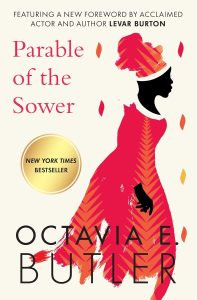(Comments were part of the 2012 best book series) I definitely have a trend in my favorite fiction books of the year of reading multiple books by the same author fairly close together. I read Poisonwood Bible in November, Flight Behavior in December and I am almost finished with Prodigal Summer.
I read a good interview with Kingsolver a couple days ago. She summarizes her advice to younger authors that I think is why I love her writing. “I think that when people read fiction, they’re really reading for wisdom. I am. That’s what most of us really love. If we read a novel that rocks our world, it’s because there’s something in it that we didn’t know already. Not just information but really wisdom””sort of what to do with our information. And wisdom comes from experience, so”¦” (She gets around to saying quit smoking so you will live longer and become wise.)
 Summary: An incredible novel of an Appalachian woman that comes to see the world as it is instead of the world that she thought she knew.
Summary: An incredible novel of an Appalachian woman that comes to see the world as it is instead of the world that she thought she knew.
Earlier this year I finally got around to reading Barbara Kingsolver’s Poisonwood Bible. I was admittedly reluctant. Kingsolver writes Literary Fiction. Her books are serious, often heavy works of fiction that, while really beautiful prose and rich lyrical stories, also have a point. It is like being told to eat your vegetables because they are good for you.
So while I really did look forward to reading this, it took me a little while to actually get started. Recently I have looked forward to happy, funny books that make me feel good. Maybe it is the fact that I am getting older or more resistant to easy fix world that too many embrace.
Kingsolver does not embrace the quick fix. She embraces a full look at the hard world that is around us. But as amazing as it is to me, her writing does not feel like propaganda. It feels like a beautiful piece of art. Yes there is meaning there, but the meaning is not crude, it does not hit you over the head like a club. Instead you can see the beauty of the art and somehow that beauty is made greater because it is has a serious subject.
Flight Behavior is narrated by a young woman from the eastern Tennessee Appalachian mountains. She is the definition of poor. Both her parents died when she was in high school, she got pregnant and quickly married and moved into her in-laws home. Her husband is a good, but uninspiring man. Her children 5 and 18 months (the first pregnancy ended in a late term still birth) are the joy of her life. She still lives on the edge of her in-laws property. They have almost no income, very little opportunity and an absence of hope.
One day, Dellarobia Turnbow (the protagonist) decides to throw away her marriage and meet a man to have an affair, she comes upon an amazing sight. It appears that the entire mountain valley above her house is on fire, but not consumed (she connects it to Moses’ burning bush). She comes to her senses and goes home before meeting the man and without understanding what she has seen.
Read more
 Summary: A pop-culture infused brief biography of Ruth Bader Ginsburg.
Summary: A pop-culture infused brief biography of Ruth Bader Ginsburg.







